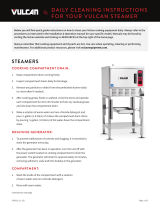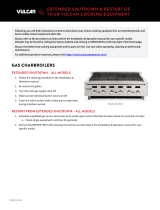
– 7 –
Drain Connection(s)
The steamer drain(s) 1" IPS (33.4 mm) (1
1
/4" NPS) should be piped to an open floor drain near the
steamer. To avoid back pressure in the drain, there should not be a solid drain connection. An open
gap between the steamer and the floor drain is required. Maximum length of drain is 6 feet (183 cm);
minimum length, 24 inches (61 cm). Minimize bends or elbows in drain line. Vent steamer drain by
extending the drain pipe 11 inches (28 cm) straight up (from the upper tee on two chamber models).
Draining Requirements
Temperatures in the boiler can reach as high as 240°F (116°C). Local codes will require that the
temperature of the drain water be 140°F (60°C) or lower. At the end of the day when purging the boilers,
some provision for lowering the water temperature must be provided by the user or installer to meet
this code requirement.
GAS CONNECTION
The data plate on the lower left side of the steamer indicates the type of gas your unit is equipped to
burn. DO NOT connect to any other gas type.
Keep the appliance area free and clear from combustible substances. Do not obstruct the flow of
combustion and ventilation air.
A
3
/4" NPT line is provided at the rear for the gas connection. Each steamer is equipped with an internal
pressure regulator which is set at 3.5" W.C. (.87 kPa) manifold pressure for natural gas or 5" W.C.
(1.25 kPa) for propane gas. Use the
1
/8" pipe tap on the burner manifold for checking pressure.
An adequate gas supply is necessary. Undersized or low-pressure lines will restrict the volume of gas
required for satisfactory performance. A steady supply pressure from 7" W.C. (1.75 kPa) for natural
gas and from 11" W.C. (2.75 kPa) for propane gas is recommended. With all units operating
simultaneously, the manifold pressure on all units should not show any appreciable drop. Fluctuations
of more than 25% on natural gas, and 10% on propane gas, will create problems and affect burner
operation. Contact your gas company for correct supply line sizes.
Purge the supply line to clean out any dust, dirt or foreign matter before connecting the line to the unit.
CAUTION: Use pipe joint compound that is resistant to the action of liquefied petroleum or
propane gases on all threaded connections.
Codes require that a gas shutoff valve be installed in the gas line before the steamer. Make sure the
pipes are clean and free of obstructions, dirt and piping compound. A manual gas shutoff valve is
supplied for each gas burner unit.
TESTING THE GAS SUPPLY PIPING
When test pressures exceed
1
/2 psi (3.45 kPa), the steamer and its individual shutoff valve must be
disconnected from the gas supply piping system during any pressure testing of the system. When test
pressures are
1
/2 psi (3.45 kPa) or less, the steamer must be isolated from the gas supply piping system
by closing its individual manual shutoff valve during any pressure testing of the system.
WARNING: PRIOR TO STARTUP, CHECK ALL JOINTS IN THE GAS SUPPLY LINE FOR LEAKS.
USE SOAP AND WATER SOLUTION. DO NOT USE AN OPEN FLAME.
Do not connect the steamer to the electrical supply until after the gas connection has been made.

















